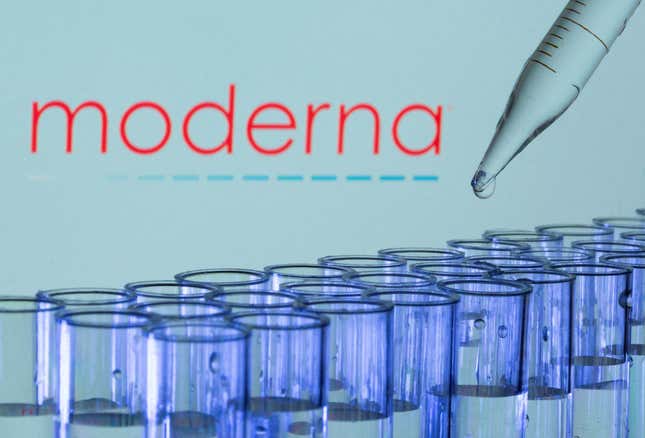
In This Story
Moderna stock jumped nearly 4% on Tuesday after the the company announced positive data from an early-phase clinical trial testing the combined use of an experimental cancer vaccine with Merck’s cancer drug Keytruda on patients with late-stage melanoma.
The study’s clinically meaningful results were announced Monday at the American Society of Clinical Oncology’s annual meeting in Chicago.
The phase 2b study involved 157 patients with stage three or four melanoma who had the majority of their tumors removed via surgery. About two-thirds of the patients were treated with the experimental vaccine mRNA-4157 (V940), which is being co-developed by Moderna and Merck, and Keytruda; the remaining third were treated with Keytruda alone.
After some three years, patients on the combined treatment had a 49% lower risk of cancer recurrence or death, compared to people who were only treated with Keytruda. The risk of their cancer spreading was 62% less.
About 75% of the patients on the combined treatment were alive two and a half years after starting the combined treatment, compared with 56% who received only Keytruda.
“These findings reinforce our commitment to advancing this innovative treatment in collaboration with Merck, and we are dedicated to harnessing mRNA technology to potentially transform cancer therapy and improve patient outcomes,” said Moderna Senior Vice President and Head of Development, Therapeutics and Oncology in a press release.
Moderna’s cancer vaccine uses the same mRNA tech used to develop its COVID-19 vaccine.
The personalized cancer vaccine is tailored to the unique genetic signature of each individual’s tumor. Researchers analyze the genes of a patient and their tumor to find up to 34 mutations that could help the body fight against the cancer. Those mutations are then used to load a molecule of mRNA that instructs the patient’s immune system on how best to fight the mutations found only on the cancer cells.
Moderna said its has started a phase 3 trial to test the combined treatment in patients with high-risk melanoma and non-small cell lung cancer.